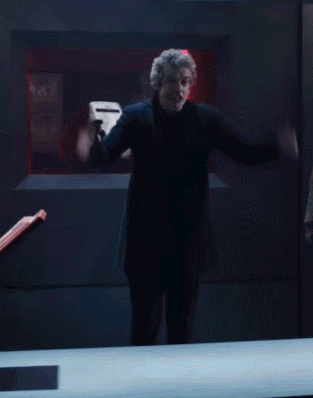I liked the RTD era, but I can't in good faith suggest a new viewer to start with Series 1. Lots of episodes, while generally good, had lots of embarassing elements, bad pacing, off characterization, pop-culture references (which isn't a problem per-se, but might annoy some people) and so on. I'm not saying RTD Who was bad, just that the show hadn't relly found itself in the earlier seasons.
To be fair, most of these problems disappeared with Series 4, but of course Series 5 is a better jumping point. It's hard for me to find something bad in S5: even Victory of the Dalek, while not a masterpiece, was easily watchable by everybody (something I can't say about the Slitheens, Fear Her, Lazarus or hell, even Rose -- a friend of mine started with Rose and found the burping trash can and the Mickey clone.. well... quite trash, and she's right).
I also really liked the story-arc of S5. The episodes were more interconnected: little by little you understood more about the whole "the universe is crack" thing, the exploding TARDIS and so on. However, you could still enjoy the episodes stand-alone and the Amy-Doctor(-Rory) dynamic was great.
So with Series 5 the baseline quality of show greatly increased and I think you average viewer will have no problem enjoying S5, 6, 7, 8, 9, 10 and, hopefully, 11, 12, 13 and so on. Of course they will find some bad episodes, but nothing embarassing or off-putting.
Unfortunately something went wrong with S6. The story-arc was heavier and, to be fair, more interesting. But that was to the detrimental of the stand-alone episodes: it's hard to enjoy the Doctor and the Ponds having fun when, well, the Ponds know the Doctor is going to die or Amy has just lost her baby. With S5 every episode played a role for the finale, the story-arc of S6 was mostly made my Moffat episodes, some story-heavy parts attached at the end of other episodes and then fillers after fillers. Which is not how Doctor Who should work, I think.
S6 Moffat episodes themselves had some problems. While the opening and AGMGTW were excellent, Hitler and Wedding didn't really do what they were trying to do (mostly because Moffat procrastinated a bit too much). The emotional trauma of Amy losing Melody isn't really solved in Hitler and Wedding was a bit of a mess, trying to explain to whole Lake Silencio business but leaving more questions than answers and basically forcing the viewers to accept River as the Doctor's wife. The problems, again, were in the *execution*: I get what Moffat was trying to do and I like it, but he could have done it way better (and he knows it, "The Empty Hearse" offering multiple explanations of Sherlock's "death" is what Wedding should have done).
Anyway by the time of S7 I think Moffat had grown a bit tired of the whole Silence arc and he basically abbandoned it, which left me disappointed because I was really into it. Instead S7 offered a series of stand-alone episodes which... well, they weren't bad at all, but they were you standard Doctor Who episodes. Everything your average S7 episode did was already done better by other episodes in the past. The only episodes I really remember fondly were the Neil Cross' ones, which is a sign the show is in need of some new writers.
The Doctor-Ponds dynamic was good of course, but story-wise it had already told everything it could tell and the departure of Amy and Rory was totally a mess. This is the only occasion I "bemoan Moffat's perverse willingness to write time travel-based stories in a series based on the premise of time travel" because it really didn't make any sense and was far away from the feels of Rose and Donna's departure. The second half wasn't any better with Clara being a very generic companion.
Luckily the Smith era ended with Day and Time. Both of them have the great virtue of establishing Clara as the character I loved in S8 and S9. Day, of course, was a great celebration of the whole show and thematically the "episode 0" of the Capaldi era, with the whole "never cruel or cowardly" thing. Time was strongly connected thematically to that: it was the story of a good man, who even facing death didn't give up his values. I really liked them. (Of course, I also liked Time resolving the various loose ends from S5-6, although that wasn't really the focus of the episode)
With Capaldi Moffat really found the right alchemy between leaving the stand-alone episodes space to breath and a more complex story arc than "some random words mentioned in every episode". He really learned from his S6 mistakes. And he took some new writers aboard: Harness, Mathieson, Tregenna and Dollard (and, to a lesser extent, Cottrell-Boyce) wrote some classics and were very talented, I vastly prefered them to Chibnall or Thompson. The softer story-arc also gave Moffat the opportunity to write Listen, Heaven Sent and Extremis. Lots of Capaldi episodes also had a philosophical or political subtext which I really enjoyed.
So tl;dr:
- RTD era was not bad, but the show turned into "some episodes are bad, but it's always watchable" with Series 5.
- S6 was good but the story-arc didn't give the stand-alone episodes enough room to breath and Moffat fucked the execution of the second half.
- S7 was good but totally unambitious.
- Moffat really learned from his mistakes during the Smith era, to the beneficial of the Capaldi era.
- The Capaldi era brought the show some amazing writers.


